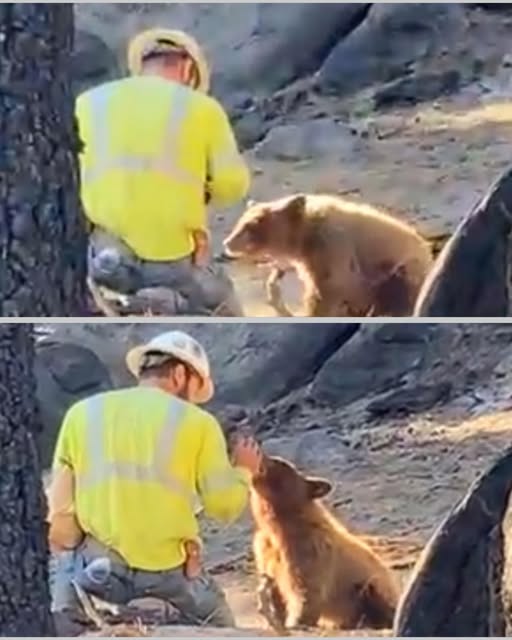When you read the story of David Harper, the logger who spares a bear cub and loses his job for it, you feel something deep: awe, sorrow, hope. It’s not just a touching anecdote. It reflects real conflicts that people face when their livelihood, their duty, and their conscience clash.
In that moment, David’s forest wasn’t a sanctuary in the conventional sense — it was his workplace. Yet, it held something he could not ignore: a den, a mother, a live cub. That juxtaposition — labor and love, destruction and protection — gives the story its pulse.
Let’s unpack some of the real-world roots and implications of that kind of choice.
One of the most immediate effects of logging is that animals lose their homes. When trees are cut, animals lose shelter, nesting sites, food sources. Many species — especially birds, mammals, insects, and amphibians — depend on dense, connected forest cover to roam, breed, and feed.
But it’s not just cutting trees: forests get fragmented. Imagine forest as one big safe zone. Logging roads, clearings, and patches of cut forest turn it into isolated “islands” of habitat. Wildlife that once traveled freely is now boxed in, worse at finding mates, and more vulnerable to predators.
Ecosystem ripple effects
When you harm one piece of an ecosystem, it ripples outward. Removing trees can destabilize soil, causing erosion and runoff into streams. That affects aquatic life. It can change microclimates under the canopy (sunlight, moisture), influencing plants and animals below.
Also, when top-level species or keystone species (those with outsized influence) suffer, the balance may shift. For example, if predators decline, prey may overpopulate and exhaust food resources. The forest becomes unbalanced.
The fight against illegal logging
In many countries, logging isn’t purely regulated. Illegal logging is rampant, often targeting high-value forests, undermining conservation, and hurting biodiversity.
Organizations like the WWF work to enforce laws, promote certification (like FSC), and support local communities so that forest use is sustainable and legal.
But enforcement and monitoring remain major challenges in many places.
When One Person’s Quiet Defiance Matters
David’s decision to spare the grove, then secretly help the cub, is heroic in a small but real way. It shows that policies are not always fair, and rules sometimes ignore life in favor of profit or bureaucracy.
Stories like this are more than inspiration — they help shape public perception, attitudes, and even policy. Researchers in conservation have pointed out that narratives and stories can be powerful tools in wildlife management: they give a face, a name, a moral compass to otherwise abstract conflicts.
In some real cases, protest movements and public pressure over forest issues have forced changes in logging laws, protected zones, or corporate practices. The “Redwood Summer” protests in California (1990) are an example: activists organized to save old-growth redwoods from large-scale logging, drawing national attention and putting pressure on timber companies.
Similarly, in British Columbia, the Clayoquot protests (1980s–1990s) pitted environmentalists and local communities against logging interests, with many arrests and significant public debate.
So David’s story resonates with history: one person, one grove, one cub — but echoing wider struggles over forests, power, and conscience.
Ethical Tension: Duty vs Compassion
David’s struggle mirrors a universal tension:
Duty & identity: Logging is his job, his “profession,” something he’s done for decades. It defines him.
Compassion & ethics: Confronting the suffering of a vulnerable creature test his loyalty to the system.
Risk & sacrifice: He risks livelihood, reputation, even legal reprisal, to act on empathy.
Many people face smaller versions of this: when work policies conflict with moral instincts (for example, in factory settings, environmental compliance, animal welfare). Some resign, others find workarounds, some remain silent. But stories like David’s remind us that change often begins in quiet, personal acts.
What Can Readers Take Away?
Every forest matter: The health of forests is not just about trees. It’s about life—every plant, insect, bird, mammal depends on forest structure, connectivity, and integrity.
Small acts can inspire: David’s feeding of a cub becomes a symbol. In real life, small acts (restoring habitat, resisting destructive orders, raising awareness) add up.
Policy needs heart: Systems and companies need ethical frameworks. Rules shouldn’t always trump life; we need balance.
Stories have power: Narratives can shift how society views nature, and push for better conservation, responsibility, and empathy.
Closing Thoughts
Your narrative of the “Compassionate Logger” is a potent reminder that forests and wildlife are not mere resources—they are living, breathing communities. And sometimes, the best path forward isn’t the one laid out in policies or plans, but the one chosen by conscience.
In a world where laws and profits often overshadow life, it takes courage to protect the powerless — whether human or animal. David paid a steep price, but gained something more elusive: integrity, respect, and the chance that others might question, might act, might choose differently.
